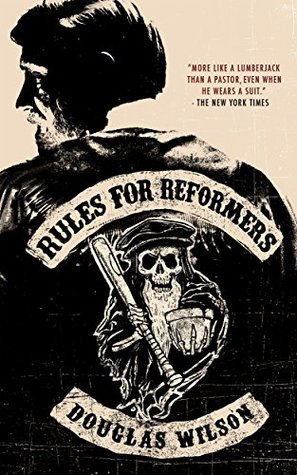More on this book
Community
Kindle Notes & Highlights
So the issue is never the amount. The issue is what it means.
This is the fundamental difference between radicals and reformers. Both recognize that good and evil exist, but the radical wants to blame the good as the root source of all evil. The reformer wants to fight evil, and so he does.
It really is simple—they call good things evil, and call evil things good (Is. 5:20).
The reason they appear to be having some success in the present (as measured by things like homo marriage) is not because of their unbelief. It is because of the Church’s unbelief. The Church is suffering a crisis of faith concerning the government of the world, as evidenced by our chariness in handling natural law. Why don’t we believe in natural law? Because of cowardice.
But if Kant can’t know anything “in itself, as it is,” then one wonders how he figured out the limitations of epistemology as they are. If we cannot know a thing-in-itself (Ding an sich), then it might as well be a transcendental absurdity (Ding an dong).
This is why it is as silly to assume that someone is a postmodernist because he emphasizes story as it would be to assume that someone was a Union soldier because he was on the field at Gettysburg, and had a gun. Right, he did, but which way was it pointed? With regard to this issue, one side will say that we have a responsibility to read our own story accurately, and fit it into God’s metanarrative, the absolute story, the ultimate story. The theme of this world’s history is, as a friend put it, “kill the dragon, get the girl.”
C.S. Lewis once said there were two basic approaches to democracy. One is idolatrous, and the other reflects a more biblical view of man. The first is the assumption that every last man’s opinion is so valuable that we should do our level best to get his input before we do anything. This is the idolatrous option. The other acknowledges the sinfulness of man, such that it is unwise to concentrate too much power in any one spot. Democracy is, in this view, part of a system of checks and balances, where the power is spread as thinly as possible in order to keep an entrenched ruling class (of any
...more
we should handle every such moment as a teachable moment.
“Behold, children are a heritage from the Lord, the fruit of the womb a reward. Like arrows in the hand of a warrior are the children of one’s youth. Blessed is the man who fills his quiver with them! He shall not be put to shame when he speaks with his enemies in the gate” (Psalm 127:3–5, ESV).
In the ancient world, the city gates were not only where defenders of a city would face invaders, but they were also what we would call the public square. Blessed was the man who had sons to stand with him in a crucial showdown at the city council. They were shoulder to shoulder behind him, and not over on the other side. Neither were they all at home playing video games
The key here, for anybody in the midst of the fray, is to have family and friends who have open access to you, and who have the liberty to say that a particular criticism strikes them as valid, or to offer criticisms of their own.
A man who has never sought forgiveness or accepted correction from his wife, kids, friends, etc. is not being a man of integrity when he refuses to back down in a public dispute. Such a refusal would just be the flag on top of his own personal mountain of arrogance.
Victory in war, including culture war, is like the collapsing of a dam. Preparation is needed for the aftermath.
Believing the universe is governed by absolute goodness is the only possible basis for thinking anything could be wrong with it now.
Adam lost his bride through disobedience at a tree; the last Adam won His bride through His obedience on one.
Of course the Second Amendment allows us modern weaponry. How else do we shoot down the surveillance drones?
Precisely because we are not disembodied spirits, there are no human rights without property rights.
Few ministers call themselves, as Paul did, “chief of sinners.” But when they do, there shouldn’t be a chorus of amens from the congregation.
Despising free markets is just a fancy way of disliking people.
Henry Van Til once noted that culture is religion externalized. Cultus (worship) lies at the heart of every culture. And the reason our culture has forgotten God is because our worship services did that first.
Incidentally, asking a woman to marry you and to walk with you as you bring up children in the Lord together, is also a potent political act. But, in contrast to the sodomy revolution, it is a political act that actually bears fruit. More people who live that way should know about it. Somebody should tell them.
The simpleton thinks that ordinary things are ordinary. The faux mystic drops some acid in order to find out that extraordinary visions are extraordinary. But only a healthy soul can see how remarkable every unremarkable thing actually is.
Why does God let things get into a horrible condition before He rises up and acts? The text above tells us why He did that to the apostle Paul. It was so that they would not trust in themselves


